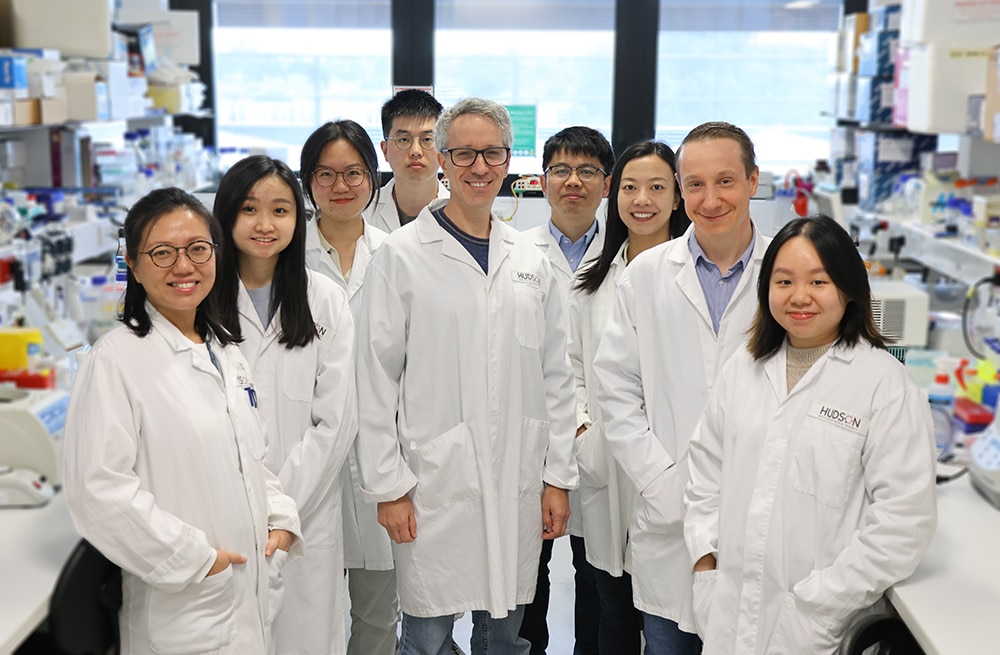Cancer Genetics and Functional Genomics
Firestein Group
Prof Ron Firestein leads the Cancer Genetics and Functional Genomics lab, and the Next Generation Precision Medicine program at Hudson Institute.

Research Group
Overview
The work of the Cancer Genetics and Functional Genomics Research group, directed by Professor Ron Firestein, is focused on using functional and integrated genomic approaches to understanding the basic underpinnings of cancer. Major themes in the lab are
- Integrative genomic approaches to identify new oncogenic drivers in cancer. The Cancer Genetics and Functional Genomics lab has undertaken sophisticated integrative genomic analyses of colorectal, lung and breast cancers. Using innovative functional genomic screens (CRISPR, shRNA/siRNA) the team has uncovered a number of novel oncogenic drivers and dissected their mechanistic input into cancer signalling pathways. Importantly, two of these targets have led to novel small molecule programs that are currently in drug development (CDK8 and LDHB).
- Identification and characterisation of Wnt pathway regulators in colon cancer. While a post-doc at Dana Farber Cancer Institute, Prof Firestein identified CDK8 as a colon cancer oncogene that regulates the Wnt/b-catenin pathway (Firestein R. et al Nature 2008). Since then, the Cancer Genetics and Functional Genomics lab has developed mouse models and in vivo systems to characterise the function of CDK8 and its paralog, CDK19, in normal homeostasis, development and cancer progression. The team has also collaborated with other groups to develop targeted therapies to upstream regulators of the Wnt pathway.
- Elucidation of novel cancer therapeutic biomarkers in preclinical models and clinical samples. The lab’s recent work has identified an important role for enhancer mediated transcripts, i.e. eRNAs, as biomarkers for distinct cancer states and predicting therapeutic response. We are now working to systematically characterise eRNA function and expression in tumours using state of the art genomic editing technologies.
Diseases we research
Research Group Head | Professor Ron Firestein
There is an urgent need for new and more precisely targeted medicines to treat childhood cancers. My work uses functional and integrated genomic approaches to understanding the basic underpinnings of cancer and identifying treatment options to target them.

Meet the team

 Shazia Adjumain
Postdoctoral Scientist
Shazia Adjumain
Postdoctoral Scientist
 Dr Paul Daniel
Postdoctoral Scientist
Dr Paul Daniel
Postdoctoral Scientist
 Dr Marius Dannappel
Postdoctoral Scientist
Dr Marius Dannappel
Postdoctoral Scientist
 Dr Hanbyeol Lee
Postdoctoral Scientist
Dr Hanbyeol Lee
Postdoctoral Scientist
 Dr Claire Xin Sun
Postdoctoral Scientist
Dr Claire Xin Sun
Postdoctoral Scientist
 Dr Chunhua (Nick) Wan
Postdoctoral Scientist
Dr Chunhua (Nick) Wan
Postdoctoral Scientist
 Dr Yichen Zhou
Postdoctoral Scientist
Dr Yichen Zhou
Postdoctoral Scientist
 Dr Danxi Zhu
Postdoctoral Scientist
Dr Danxi Zhu
Postdoctoral Scientist
 Nicole Alexia
Honorary Research Associate
Nicole Alexia
Honorary Research Associate
 Abigail Yoel
Honorary Research Associate
Abigail Yoel
Honorary Research Associate
 Vikesh Ajith
Research Support Staff
Vikesh Ajith
Research Support Staff
 Dr Nicole Chew
Research Support Staff
Dr Nicole Chew
Research Support Staff
 Yiwen Guan
Research Support Staff
Yiwen Guan
Research Support Staff
 Rajithri (Dilru) Habarakada
Research Support Staff
Rajithri (Dilru) Habarakada
Research Support Staff
 Bao Le
Research Support Staff
Bao Le
Research Support Staff
 Melissa Loi
Research Support Staff
Melissa Loi
Research Support Staff
 Ishika Mahajan
Research Support Staff
Ishika Mahajan
Research Support Staff
 Dr Yuxin (Sally) Sun
Research Support Staff
Dr Yuxin (Sally) Sun
Research Support Staff
 Yaseer Syed
Research Support Staff
Yaseer Syed
Research Support Staff
 Dr Hugh Gao
PhD Student
Dr Hugh Gao
PhD Student
 Dr Yuqing Liang
PhD Student
Dr Yuqing Liang
PhD Student
 Anna Lin
PhD Student
Anna Lin
PhD Student
 Dingyin Sun
PhD Student
Dingyin Sun
PhD Student
 Angie Bitticaca
Honours Student
Angie Bitticaca
Honours Student
 Lily Fraser
Honours Student
Lily Fraser
Honours Student
 Karyn Tjahyadi
Visiting Scholar
Karyn Tjahyadi
Visiting Scholar
 Yi-Fang Yang
Visiting Scholar
Yi-Fang Yang
Visiting Scholar
News from the lab
Student opportunities

Publication highlights

